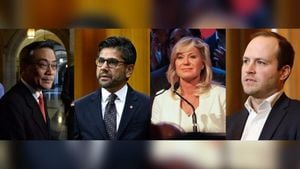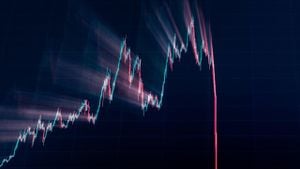The introduction of the proposed DOGE Dividend Stimulus Plan has recently sparked significant debate, as it seeks to distribute anticipated savings from government cuts back to American taxpayers. Launched by James Fishback, CEO of Azoria Partners, the concept envisions using funds generated through Elon Musk's initiative known as the Department of Government Efficiency (DOGE), aiming to save $2 trillion. The plan suggests redistributing 20% of these savings, amounting to about $400 billion, to approximately 79 million households, creating checks worth $5,000 each.
Fishback's idea emerged as he tagged Musk on social media, asserting, "American taxpayers deserve a ‘DOGE Dividend’: 20% of the money DOGE saves should be sent back to hard-working Americans as a tax refund check. It was their money in the first place." Musk’s participation, coupled with the endorsement of former President Donald Trump, has added weight to this contentious proposal.
But there are concerns about the plan. Under this structure, only households with net federal income tax contributions would qualify for the payments. A significant portion of low-income Americans, as noted by the Tax Policy Center, would be left out; 93% of those earning under $20,000 paid no income tax as of 2022. Critics argue such exclusion could backfire politically, potentially alienATING voters who feel neglected.
Critics like Mark Zandi, Chief Economist at Moody’s Analytics, raised questions about the plan’s feasibility, stating, "We have to actually figure out if any money is saved at all before promising people checks in the mail. If you give a dividend, it certainly doesn’t help reduce the deficit." He emphasized the inherent risks associated with cutting federal jobs and services, to which Zandi cautioned, "It’s not like there’s a free lunch here. Cutting jobs and scaling back government programs have real economic effects." His expert insights contribute to the skepticism surrounding the reliability of the claimed $2 trillion savings.
Despite Musk's initial promise of extensive cuts, the reality falls short, having only achieved savings of $55 billion to date. For example, DOGE's claim of saving $8 billion from canceled contracts turned out to be exaggerated; the actual contract was worth only $8 million. This raises significant doubts about whether the projected savings can realistically cover the promised checks.
Political ramifications also loom large. House Speaker Mike Johnson has expressed cautious skepticism, diverging from the enthusiastic support of both Musk and Trump. "Politically, it would be great for us... But fiscal responsibility is what we do as conservatives. We have a $36 trillion federal debt. I think we need to pay down the credit card, right?" His sentiments underline the internal divergence within Republican opinions on the plan.
Can the DOGE Dividend succeed? The inherent contradictions are evident: how can one issue dividends aimed at stimulating the economy, yet exclude those who could most benefit from financial relief? Some economists like Zandi have pointed out the potential inflationary effects. If significant checks are issued to many citizens, it could exacerbate existing economic pressures. He encapsulated these concerns succinctly: "That’s a pretty strong position to take—that these jobs have no benefit and no importance for the well-functioning of our economy and the nation."
Fishback argues, countering inflation concerns, by claiming, "There is nothing inflationary about paying off debt, saving for emergencies, or investing in college or retirement. Debt paydowns are actually deflationary.” His commitment to moving forward with the DOGE Dividend, regardless of projected savings, reflects more than merely financial ambition; it seeks to restore faith and accountability between the government and taxpayers.
The future of this plan remains murky. With continuing discussions, Trump has tempered expectations, acknowledging the ambitious nature of claims surrounding savings; there’s cautious optimism but also significant room for doubt. At this stage, for citizens hoping for the $5,000 checks, hope may be dwindling.
Fishback, ever undeterred, believes even reduced dividends can symbolize government accountability and help ordinary Americans through tough economic times. He stated, "Let’s say we only save $500 billion. Then the check is $1,250. That’s real money. It’s not necessarily about the dollar amount—it’s about the symbolism of the government sending money back to hardworking Americans.”
While the allure of “free money” appeals on the surface, the DOGE Dividend faces considerable hurdles—economic feasibility, political acceptance, and the contradictions inherent to who will benefit. Whether this ambitious model of government efficiency through the DOGE Dividend materializes or fades as another fleeting political narrative remains to be seen.



